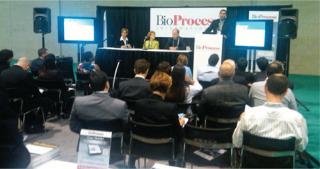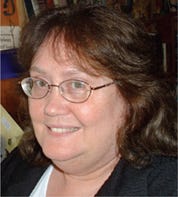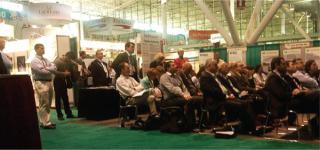Another successful BioProcess Theater at the Biotechnology Industry Organization’s annual BIO Conference and Exposition (Boston, MA) led BPI into the summer on a high note. In fact, a number of our presentations this past June attracted standing-room–only audiences in the exhibit hall’s BioProcess Zone, with steady attendance throughout the three days of the event.
The BioProcess Theater creates a forum for discussion of technologies and applications for both exhibit-hall–only attendees and full-conference registrants. Presenters enjoy long conversations afterward with attendees, and we are always delighted to see those discussions continuing on the “periphery”. BPI continues to enjoy a productive collaboration with BIO’s event organizers to manage the logistics of this forum (this year enabling us to record the presentations) — and we are already planning for our 2013 program.
Roundtables: This year, three panel discussions on Monday afternoon (18 June 2012) offered insights on building biomanufacturing in emerging markets (chaired by Stephen Flavin, provost of Worcester Polytechnic Institute); CGMP operational excellence and infrastructure harmonization from laboratory to plant (chaired by John Helfrich, vice president of GMP automation programs at Accelrys); and regulatory and technical advances toward biosimilar development (chaired by Charles Squires, vice president of discovery and partnerships at Pfenex).
On Tuesday (19 June 2012) BPI’s publisher, Brian Caine, chaired a panel that continued the discussion from BPI’s single-use supplement article on the potential for standardization of disposables. Representing some major suppliers of single-use technologies/components, panelists fielded practical questions from the audience, indentifying the pros and cons of standardization, how it might or might not happen, and whether it could hamper still-needed innovations in materials and supply chain management. When vendor representatives such as these can step outside their individual product lines to address common concerns, the audience and industry benefits tremendously. We are grateful to Jerry Martin (Pall Corporation’s senior vice president of public affairs), Jeffery Craig (director of global marketing and North American sales for ATMI Life Sciences), Paul Priebe (FMT director at Sartorius Stedim North America), and Richard Pearce (EMD Millipore’s director of strategy and business development) for their willingness to share their knowledge of the industry with us.
Wednesday’s roundtable (21 June 2012) began where BPI’s March cell-therapy supplement had left off to address “Cell Therapies: Building the Pillars to Success”. Under the expert guidance of chair Jon Rowley (innovation director of cell processing technologies at Lonza), the group talked about ways in which cell therapies can be brought to full commercial realization. Panelists Chris Mason (University College London professor), Robert Speziale (Invetech’s vice president of business development), and Barry Rosenblatt (president of SME Biotech Consulting) kept the discussion lively and topical. And one final roundtable on Thursday morning (22 June 2012) was chaired by John Helfrich of Accelrys, who presented insights on “CGMP Operational Excellence and Infrastructure: Harmonization from Lab to Plant.”
Tuesday morning’s upstream talks looked at optimizing strain design and development, technologies for closing single-use upstream processes, and the economic impact of single-use bioreactors. The afternoon’s downstream presentations addressed using disposable resins in harvest operations, next-generation PEGylation technologies, high-concentration buffer reformulations, single-use depth filtration, new methods of screening for microbial contamination, and technologies for driving down purification costs.
Wednesday’s presentations continued the cell-therapy theme from that morning’s panel. Speakers addressed cell expansion and scale-up strategies, controlling and optimizing cellular raw materials, and in general, further steps and technologies needed for commercial manufacturing.
Check them out: You can listen to the BPI Theater podcasts online at www.bpidm.com.
With BIO scheduled much earlier next year (22–25 April 2013, in Chicago), we are already signing up speakers and researching themes for our next BioProcess Theater. On behalf of BioProcess International, I wholeheartedly thank everyone who helped this year’s audiences enjoy such state-of-the-art presentations. And I invite you to contact us (by emailing Brian Caine, [email protected]) if you have a topic to suggest for 2013.
S. Anne Montgomery
editor in chief









